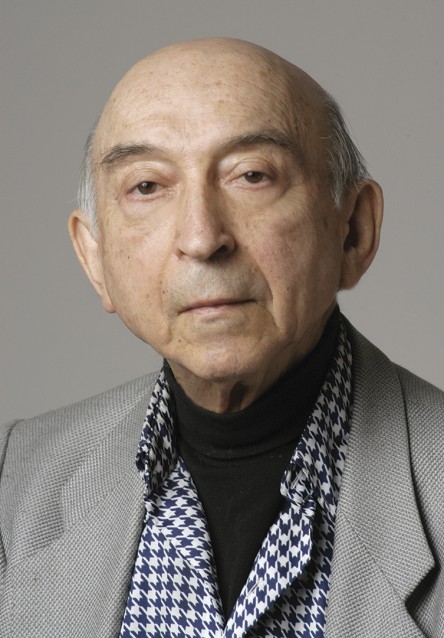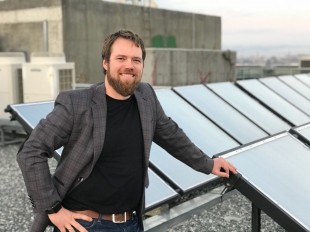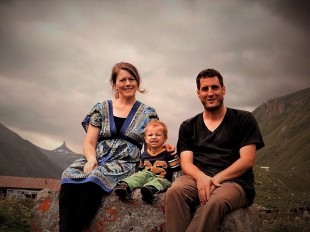On 6 September Visions was saddened to hear of the death of Baku-born computer scientist and electrical engineer Lotfi Aliasker Zadeh, best remembered as the founder of fuzzy logic, a theory applied across many different areas of industry, from subway systems and automobiles to vacuum cleaners and washing machines. In the following article, Martha Lawry recalls meeting this unconventional professor at his home in Northern California only a few years ago.
The day I met Lotfi Zadeh didn’t start out well. I was struggling to manoeuvre a luxury-sized rental car out of a tight parallel parking spot on a steep hill in San Francisco. I had three Azerbaijani passengers helpfully shouting out advice in multiple languages – A little more! Stop! Pull to the left! Meanwhile, my GPS kept announcing that it had lost its signal in the forest of tall buildings. We were on our way to meet the professor in his house in Berkeley, which shouldn’t have been a matter of great tension, but perhaps on some level we all felt the urgency of the clock ticking on his life.
By the time we reached the smoother architectural terrain of Berkeley, everyone’s nerves had cooled. I was greatly relieved that the professor’s neighbourhood had driveways between all the small ranch-style houses. There was no visible street number matching the Zadehs’ address, but we found the house by process of elimination. We had to open a very non-descript gate to see whether there was even an entrance on the front side of the building. We finally did find the door, and the professor’s caregiver came out to greet us.
She hurried us through to the back room, past a staircase buried in potted plants and a hallway lined in shelves of trophies, framed awards, and even a bronze bust of the professor. She told us he hadn’t been expecting us quite so early, so we would have to wait a bit.
This visit was in November of 2015. I was on a business trip with colleagues from Eurasian Academy, a private academy of sciences headquartered in Baku. The official purpose for our visit was for Professor Hamlet Isakhanli to present the Eurasian Legend award to Professor Zadeh in recognition of the latter’s role as one of the five founding members of the Academy. Professor Zadeh was an ideal figurehead for Eurasian Academy because of his Azerbaijani background and his mathematical accomplishments.
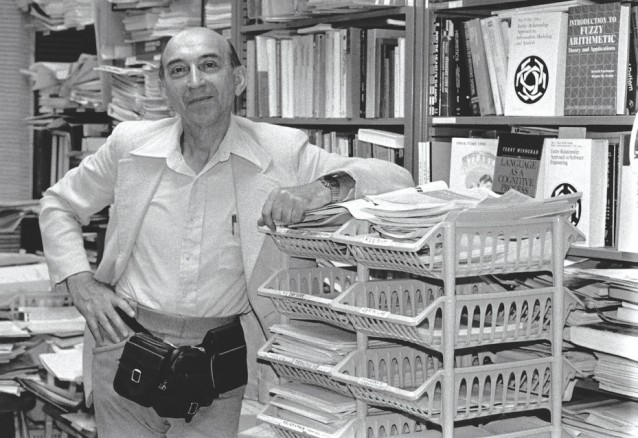 Lotfi Zadeh in his office in Soda Hall, UC Berkeley, 1988. Cindy Manly-Fields, courtesy of UC Berkeley
Lotfi Zadeh in his office in Soda Hall, UC Berkeley, 1988. Cindy Manly-Fields, courtesy of UC Berkeley
He was born in Baku in 1921 and lived there until he was 10 years old. Then his family moved to Iran, where he excelled in his studies and had exposure to American teachers. After his graduation from the University of Tehran, he moved to the United States. He completed a master’s degree in electrical engineering at MIT in 1946. He then finished a PhD at Columbia University and taught there for 10 years, where he eventually received his full professorship. In 1959, he moved to the University of California, Berkeley, where he spent the remainder of his career developing his theories such as fuzzy sets and fuzzy logic.
As the team set up cameras to film an interview I found myself swept up in the atmosphere of the room. One side of it was cluttered with the relics of a scientist beyond his prime: a dusty PC framed with post-it notes in large handwriting, rows of filing cabinets, boxes of papers. Some invisible line divided the room between decaying laboratory and Victorian-style sitting room, but even the parlour side was clearly not immune to the professor’s relentless pursuit of knowledge: all the furniture was dotted with little stacks of books. We had to move literature off the couch to clear a space for the interviewer to sit. A painted family portrait hung on the wall above a piano covered in enough books to suggest that it hadn’t been played in quite some time.
One more grey metal filing cabinet stood in the corner on the parlour side of the room behind several baskets of silk flowers. Like its counterparts, it was flagged with post-it notes. Down one side of the cabinet was painted the word FUZZY.
Like this out-of-the-box professor, the room refused to submit itself to pre-determined categories.
The public will remember Professor Zadeh most for his work on the theory of fuzzy logic. For me, the lone filing cabinet on the “wrong” side of the room is an apt example of his ideas. In fuzzy logic, not everything is black and white. The world isn’t restricted to binary. Rather, 0 and 1 are understood as the extreme poles on a continuum of possibilities. This multi-purpose room at the Zadehs’ house wasn’t strictly storage on one side and a parlour on the other; it was a gradient between the two, with exceptions in the placement of items to prove the point that not every space can be classified as just one type of room. Like this out-of- the-box professor, the room refused to submit itself to pre-determined categories.
Through the door was the kitchen, which grabbed my attention because there was a recipe in bold print taped prominently to one of the cabinets. It was instructions for making oladi (Russian pancakes), including a note that the professor liked these as a special treat on certain days of the week. Professor Zadeh had an Iranian Azerbaijani father and a Russian Jewish mother, so this must have been a culinary tradition he inherited from his mother. I imagined him as a child standing on a chair at the counter, watching as his mother poured batter into a skillet. In a way, this man’s life began and ended in accordance with his fuzzy ideas, as he never fit entirely into one nationality or country.
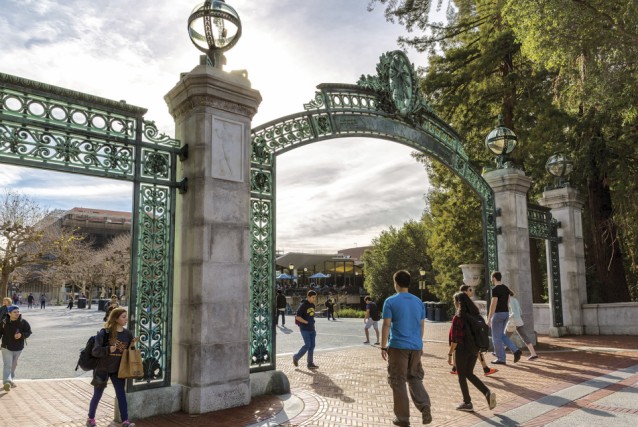 Main entrance to the campus of UC Berkeley, where Lotfi Zadeh spent the golden years of his career. Photo: cdrin/Shutterstock.com
Main entrance to the campus of UC Berkeley, where Lotfi Zadeh spent the golden years of his career. Photo: cdrin/Shutterstock.com
As I was thinking about the pancakes and how endearing it was that he still loved this traditional recipe from his past, Lotfi Zadeh shuffled into the room, escorted by his caregiver. He was wearing a patterned silk button-down shirt, but it was hard to focus on anything but his eyes. He had the brightest, most wonder-filled eyes I’ve ever seen. Many people over 90 years old have a watery or glazed look about them, but not this man. He peered around at everyone as if he had been waiting all his life to see us. He had an incessant, sincere smile dominated by the raising of his eyebrows so that his forehead crinkled but not the corners of his shining round eyes.
When he saw the cameras, he went to put on a grey blazer and pinned on a military-style medal with a ribbon in the three colours of the Azerbaijani flag. He apologised repeatedly for not shaving that morning, as if he had any facial hair warranting a razor.
He graciously gave us an interview. Every syllable was made all the more precious by its difficulty to catch. We all ended up hunching towards him at the edges of our seats, straining to hear his whispery voice. Even his lapel microphone had a hard time picking up much of what he said.
What impressed me most about Professor Zadeh was his total lack of presumption. He shook each of our hands and looked into our eyes long and hard. All that was left of his wispy white hair was two tufts above his ears, which he honed in like radar on each person speaking. He listened carefully and responded precisely to what we had said. We had come to present him an award and take an interview, but he took time to inquire about our work and even asked us to convey his admiration to the person who designed the trophy we gave him.
After the interview was finished, the professor insisted on taking us out to lunch, even though that hadn’t been included in his schedule for the day. It ended up involving some tricky coordination with his caregiver and physical therapist, who taught us how to assist him as he walked to and from the vehicle. He brought us to one of his favourite restaurants, the Doubletree Marina Restaurant and Lounge at the Berkeley Hilton.
Lunch was a bit frustrating because it was hard to hear anyone speaking, but the professor listened carefully to us and wanted to make sure everyone was happy with the service. I rather awkwardly tried to keep the conversation going by talking about my grandfather, who graduated from the same MIT electrical engineering program a few classes before Professor Zadeh. He humoured me by asking my grandfather’s name and graduation year, even though it was nearly impossible that they would have known each other.
He had the brightest, most wonder-filled eyes I’ve ever seen
Another little unforgettable moment happened at the end of the meal when he ordered an extra few oatmeal cookies to take home. He informed us that these were his favourite cookies in Berkeley.
As we parted ways outside the restaurant, Professor Zadeh took his time to say goodbye to each of us. It must have been uncomfortable for him to stand up for so long, but as with our introductions, he was attentive to each person. He carefully bestowed respect on the senior member of our delegation and chivalry toward the ladies. As we shook hands, he leaned in and whispered in my ear, you have a very nice figure.
This was a man who spent much of his life in pursuit of teaching computer systems to understand logic in a more human way. It only makes sense that the man himself would be so human.
I am privileged to have met Lotfi Zadeh. On behalf of the Visions staff, I extend condolences to his family and the scientific community, which has lost a real treasure.